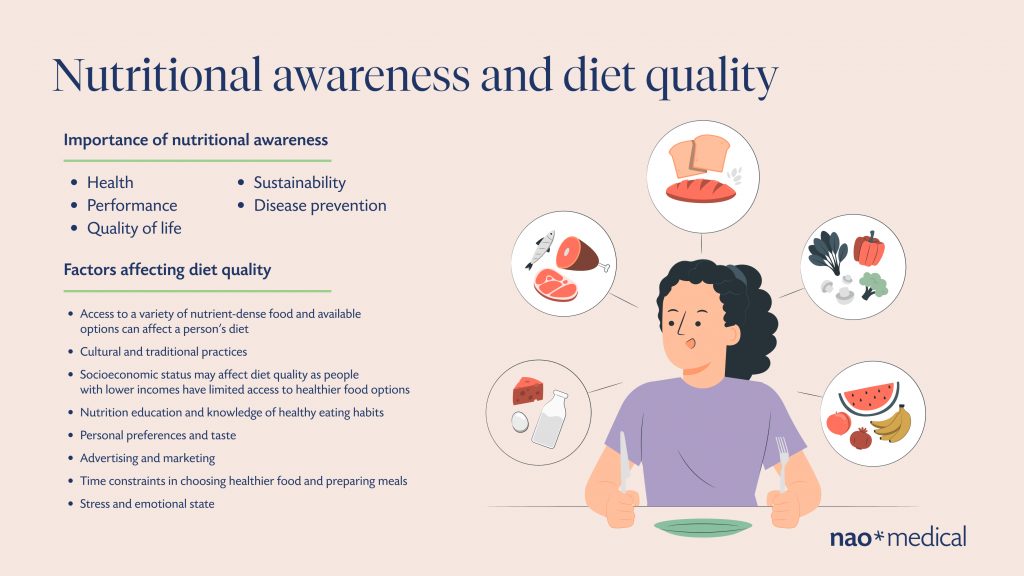
Nutritional awareness and diet quality are two critical factors that significantly impact our overall health and well-being. By increasing our awareness and prioritizing diet quality, we can improve our health, prevent chronic diseases, and lead happier and healthier lives.
The rise in unhealthy food choices and sedentary lifestyles have made it more important than ever to increase our nutritional awareness and promote better diet quality. In this article, we will explore the concept of nutritional awareness, what factors affect diet quality, and how we can improve our eating habits to achieve better health outcomes.
What is nutritional awareness?
Nutritional awareness refers to knowledge and understanding of the role of various nutrients in the human body and the impact of food choices on health. It involves being aware of the nutritional content of the foods you consume and making informed choices to maintain good diet quality.
Why is nutritional awareness important?
Nutritional awareness is important for several reasons:
- Health: A balanced and nutritious diet is essential for maintaining good health and preventing chronic diseases like obesity, diabetes, and heart disease.
- Performance: Proper nutrition can improve physical and mental performance, making it easier to focus and be productive.
- Quality of life: A nutritious diet can improve the overall quality of life, helping to reduce the risk of illness, improve mood, and increase energy levels.
- Sustainability: Understanding the impact of food choices on the environment can help promote sustainable practices and reduce the carbon footprint.
- Disease prevention: Nutritional awareness can help prevent or manage chronic diseases, which can lead to significant healthcare cost savings over time.
What is diet quality?
Diet quality refers to the overall nutritional value of an individual’s diet. It takes into account your dietary intake and the types and amounts of foods and beverages consumed and how they contribute to meeting nutrient needs.
A diet that is high in nutrient-dense foods like fruits, vegetables, whole grains, lean proteins, and healthy fats is considered to be of high quality. In contrast, a diet that’s high in energy-dense foods and is low in nutrients like sugar, refined grains, and saturated fats is considered to be of low quality.
Diet quality is an important determinant of overall health and well-being. It’s strongly linked to the prevention and management of chronic diseases like obesity, diabetes, and heart disease.
What are the factors that affect diet quality?
There are several factors that can affect diet quality, including:
- Access to a variety of nutrient-dense food and available options can affect a person’s diet
- Cultural and traditional practices
- Socioeconomic status may affect diet quality as people with lower incomes have limited access to healthier food options
- Nutrition education and knowledge of healthy eating habits
- Personal preferences and taste
- Advertising and marketing
- Time constraints in choosing healthier food and preparing meals
- Stress and emotional state
How can we improve nutritional awareness?
Here are some ways to improve nutritional awareness:
- Read food labels: Food labels provide nutritional information on the nutrient content of foods and can help you make informed choices about what you eat.
- Educate yourself: Take the time to learn about nutrition and healthy eating habits by reading books, and articles, or attending informative classes.
- Plan your meals: Plan your meals ahead of time to ensure you are eating a balanced diet that includes a variety of nutrient-dense foods.
- Eat a variety of foods: Eating a variety of nutrient-dense foods can ensure that you are getting a wide range of essential nutrients.
- Cook at home: Cooking at home allows you to control the ingredients and portion sizes according to your body mass index, which can help improve the quality of your diet.
- Seek guidance from a registered dietitian: A registered dietitian can provide personalized nutrition advice, and dietary guidelines, and help you develop a plan to improve your nutritional awareness.
- Stay informed: Stay up-to-date on nutrition news and research to ensure that you are aware of the latest recommendations and guidelines.
Get nutrition tips and advice from the experts
If you’re interested in improving your nutritional awareness and making informed choices about your diet, consider seeking guidance from a registered dietitian or nutritionist. With their expertise, you can learn about the role of nutrients in the body, the impact of food choices on health, and strategies for maintaining a balanced and healthy diet.
Making an appointment with a registered dietitian or nutritionist can be a great first step toward achieving your health and wellness goals.
 (917) 310-3371
(917) 310-3371


